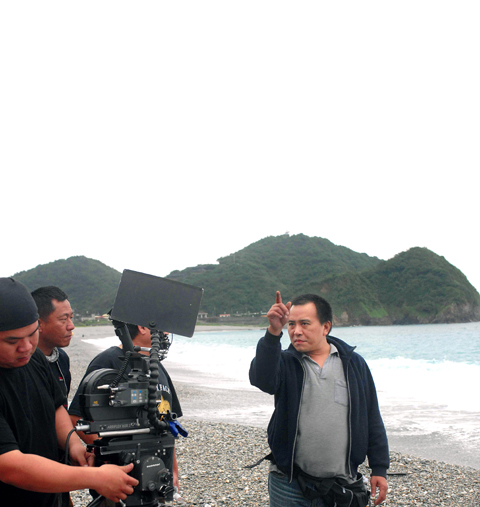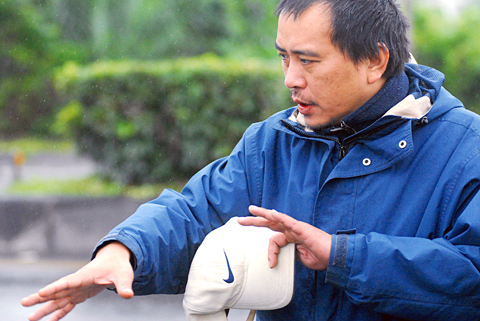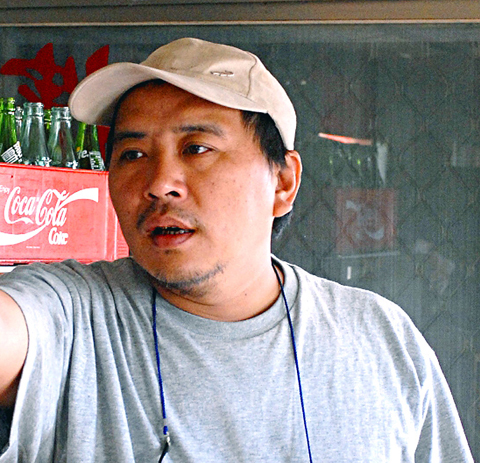An inveterate betel nut chewer and chain smoker, director Chang Tso-chi (張作驥) cuts a bit of a rough-hewn, gangsterish figure. But he’s also exceedingly polite and possesses a natural ability to put people at ease, as when he arrives at the outdoor cafe in Ximending (西門町) for our interview, apologizing for being half an hour late, 8-year-old son in tow. They’ve just seen an advance screening of Chang’s latest film, Soul of a Demon (蝴蝶).
Chang, who is divorced, is playing the father today, but our interview lasts long past the planned 60 minutes, as he wanders from anecdotes such as a story about his disastrous fishing trip with a group of smokers in a remote area where they couldn’t find cigarettes, to observations about Ximending’s street culture when he asks his assistant to fetch him a pack of betel nuts. Even with his non-linear style of thinking, Chang is a natural storyteller. He enthralls me with his expressive cadence, sharp repartee, and the occasional swear word.
Witty and cordial, the 47-year-old director talked about his art, the craft of filmmaking and his latest work, which took five years to complete and suffered a series of setbacks, including a one-year-long halt in production — the company that was to provide CGI effects backed out — that almost defeated him.

PHOTO COURTESY OF CHANG TSO CHI FILM STUDIO
Taipei Times: When did you first develop a passion for cinema?
Chang Tso-chi: The first film I saw was Fist of Fury (精武門). Whenever a Japanese person appeared in the film, people would throw things at the screen. Everyone [in the theater] had a pair of plastic nunchucks; everyone went crazy and cheered and clapped whenever Bruce Lee (李小龍) started kicking ass.
When I was doing my military service I had a good friend who is now a professor. One day he asked me: “What are you going to do after you go back home — fix televisions or something?” I thought about it and decided to get into a career in photography because photographers seem to have more freedom. I visited a few colleges and didn’t like them. Then one day I went to Yangmingshan [where Chinese Culture University (中國文化大學) is located]. It was misty [outside] and I was like, “Wow, you could make a martial arts film here.” That, and as a drama major you got to walk past the dance department where there were pretty girls in one classroom after another. But seriously, Taiwanese New Wave cinema had just taken off when was I preparing for the college entrance examination. Before that no one wanted to study cinema. In my year, around 300 people were competing for seven openings.

PHOTO COURTESY OF CHANG TSO CHI FILM STUDIO
(After graduating from Chinese Culture University, Chang broke into filmmaking as a continuity clerk, or script supervisor. During his 14 years in the industry before his directorial debut, Chang worked with such film doyens as Yu Kang-ping (虞堪平), Hou Hsiao-hsien (侯孝賢) and Tsui Hark (徐克). His first film, 1993’s Midnight Revenge (暗夜槍聲), drew little attention, but his next three, Ah Chung (忠仔, 1996, also known as Zhong zi), Darkness and Light (黑暗之光, 1999) and The Best of Times (美麗時光, 2002), firmly established Chang as an internationally known auteur recognized for his tender but unflinching, incredibly lifelike portraits of people living on the margins of society.)
TT: What was the most important thing you learned during the 14 years before you made your first film?
CT: I learned that filmmaking isn’t rocket science. Your job is merely to visualize what is in your own mind and make other people believe it. Watching a movie is a magical experience, don’t you think? You enter the theater holding a box of popcorn. You know the whole thing is fake. The lights go off, you sit there eating popcorn and you surrender yourself to whatever is being shown on the screen for 90 minutes. When the lights are turned back on, you go, “Hmm, that’s not real,” and you leave the theater. Some [directors] move you and make you cry. Others wake you up and make you think.

PHOTO COURTESY OF CHANG TSO CHI FILM STUDIO
There are people who say art-house cinema bores the heck out of audiences — you say my films are like that? [Chang needles the young PR handler who remains with us throughout the entire interview]. My films are calculated. When the story hits the 30-minute mark something big always happens to wake up the people who are half-asleep.
TT: Why is that? Is it because you are afraid of boring your audiences?
CT: No. My films don’t have flashbacks or alternate between color and black-and-white. In terms of form, I have my own limits and idiosyncrasies. Besides, audiences aren’t familiar with most of my actors. I build up my stories not from who my actors are but from [the characters’] family relationships and how they interact with each other. It usually takes 30 minutes before the narrative finally starts. [At the end] people in the audience are like, “Oh OK. Now I know what this family is all about. What? The film is over already? But who was that guy? Can they play that again?”
TT: Soul of a Demon was originally three hours long, but you cut a lot from supporting roles like the grandfather.
CT: Yes. Since I’m not a master [director], I really shouldn’t pull a stunt like that. The reason why it was originally three hours .
long is that I tried to tell a complete story without the planned CGI effects. Do you remember the opening scene where Che is on his way home along the Suhua Highway (蘇花公路)? There were supposed to be [CGI] dolphins leaping out of the water [in that scene]. I have a habit of setting the tone for my films around one minute after they begin. So people think, “OK, from this point on I won’t be able to tell what is real and what is not.” The films I made before are realistic in structure. [For Soul of a Demon], I wanted to jump out of the frame. Put two real things together and all of sudden you get absurdity.
TT: Does it take you a long time to conceptualize and develop your stories?
CT: Not really. It’s just a bad habit I used to have. I usually take one year off after each work and spend all the money I earned. When do I plan the next project? When the accountant says to me, “We don’t have enough money to pay for the bills next month.”
TT: Doesn’t your film studio do television productions that make money?
CT: No, we do mostly film productions. Even Holy Ridge (聖稜的星光) [an award-winning television series shot in super 16mm film] was like 11 miniature movies. That was an entirely new experience for my company: we lost NT$30 million. The government has made lots of effort to promote digital cinema. I have nothing against that. The question is whether or not a government should promote digital photography? No, because it is too easy. In traditional filmmaking even a focus puller needs 10 years to master [his or her] craft. Experience is everything since you don’t know what you have on the film until it’s developed. I don’t think that any effort is being made to [compared to two decades ago] train and support experienced, professional film technicians in Taiwan.
I decided to make the effort myself and spent NT$10 million of the profit from The Best of Times on cinematography equipment. While my team was in Shei-pa National Park (雪霸國家公園) shooting Holy Ridge, I was in the city raising money and training assistants. We sent out nearly 300 assistants to the mountain during two years of filming. Of course sometimes late at night I say to myself, “You crazy idiot.”
TT: Why do you prefer working with amateur and novice actors?
CT: A script has no temperature and humidity. You have to feel this on the set. You have to have surprises and adventures. With professional actors, the film is done when the script is done. When the director wants to change things around, they’ll be like, “But I already memorized my lines.” And you’ll be like, “Didn’t I just give you the script like one minute ago?”
TT: You ran into a lot of obstacles while making Soul of a Demon. Did that experience alter your view of independent filmmaking?
CT: I thought about giving up independent filmmaking when the production was forced to come to a halt. Later when the money from CMC Movie Corporation (中環娛樂) came in, I felt that perhaps I should make some changes and work with big investors. I realize that big investors have their own agenda. They don’t do NT$30 million productions. They do NT$800 million. But I’m not interested in making films about who fought who during the Three Kingdoms period. Stories about Taiwan are fascinating enough for me. Film is all about drama. It’s good enough to make a film that moves people and keeps your investors happy. I promised my father that I would make a film he could understand. [Chang’s father passed away during the shooting of Soul of a Demon. Some critics have observed that writing a character with an Oedipus complex into the film was Chang’s way of dealing with his loss]. ... My father was an ordinary person, a public servant. People from his generation believed in Chiang Kai-shek (蔣中正). Regardless of whether he was press-ganged or tricked into being a solider, that was his life.
I am making a film about a father. Not my father, but 20 fathers. It’s a compilation of shorts that make you cry in five minutes. It was a challenge.
TT: Have you thought about telling the story of the Mainlanders who came [to Taiwan] with the KMT army through the story of your father?
CT: Yeah, that’s gong to be my next project [temporarily titled Summer Dream (暑假作業之夏日的夢)]. It’s about an 8-year-old boy who visits his sick granddad in Shihding (石碇) [in Taipei County]. I want to capture the beauty of Shenkeng (深坑) and Shihding.
TT: It has been said that Soul of a Demon is closely related to the issue of identity, both on a historical and a personal level. What do you think about that observation?
CT: I’m a second-generation of Mainlander. But all my characters speak Taiwanese and Hakka. I chuckle every time my actors speak Mandarin. Mandarin doesn’t have the taste of real life, whereas Taiwanese and other [Chinese] dialects smell like living things. I remember Li Ao (李敖) once said there is no distinction between Mainlanders and Taiwanese [non-Mainlander Han Taiwanese] in Taiwan. The distinction is between the privileged and the underprivileged. I may start putting old KMT soldiers in my films and help them tell their own stories.

Taiwanese chip-making giant Taiwan Semiconductor Manufacturing Co (TSMC) plans to invest a whopping US$100 billion in the US, after US President Donald Trump threatened to slap tariffs on overseas-made chips. TSMC is the world’s biggest maker of the critical technology that has become the lifeblood of the global economy. This week’s announcement takes the total amount TSMC has pledged to invest in the US to US$165 billion, which the company says is the “largest single foreign direct investment in US history.” It follows Trump’s accusations that Taiwan stole the US chip industry and his threats to impose tariffs of up to 100 percent

On a hillside overlooking Taichung are the remains of a village that never was. Half-formed houses abandoned by investors are slowly succumbing to the elements. Empty, save for the occasional explorer. Taiwan is full of these places. Factories, malls, hospitals, amusement parks, breweries, housing — all facing an unplanned but inevitable obsolescence. Urbex, short for urban exploration, is the practice of exploring and often photographing abandoned and derelict buildings. Many urban explorers choose not to disclose the locations of the sites, as a way of preserving the structures and preventing vandalism or looting. For artist and professor at NTNU and Taipei

March 10 to March 16 Although it failed to become popular, March of the Black Cats (烏貓進行曲) was the first Taiwanese record to have “pop song” printed on the label. Released in March 1929 under Eagle Records, a subsidiary of the Japanese-owned Columbia Records, the Hoklo (commonly known as Taiwanese) lyrics followed the traditional seven characters per verse of Taiwanese opera, but the instrumentation was Western, performed by Eagle’s in-house orchestra. The singer was entertainer Chiu-chan (秋蟾). In fact, a cover of a Xiamen folk song by Chiu-chan released around the same time, Plum Widow Missing Her Husband (雪梅思君), enjoyed more

Last week Elbridge Colby, US President Donald Trump’s nominee for under secretary of defense for policy, a key advisory position, said in his Senate confirmation hearing that Taiwan defense spending should be 10 percent of GDP “at least something in that ballpark, really focused on their defense.” He added: “So we need to properly incentivize them.” Much commentary focused on the 10 percent figure, and rightly so. Colby is not wrong in one respect — Taiwan does need to spend more. But the steady escalation in the proportion of GDP from 3 percent to 5 percent to 10 percent that advocates